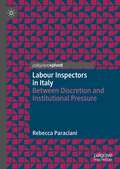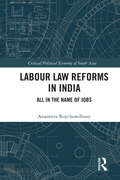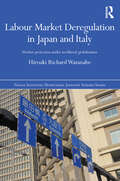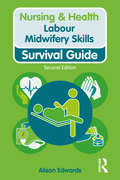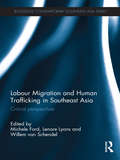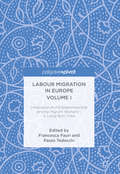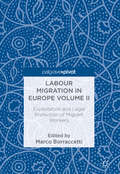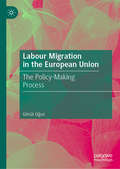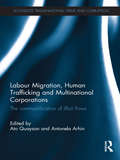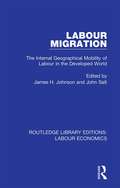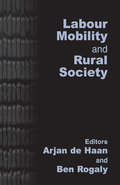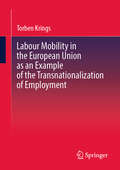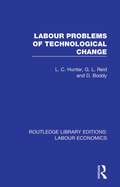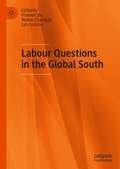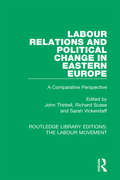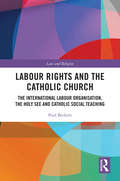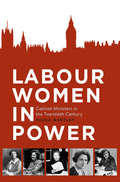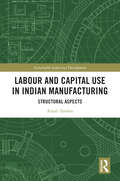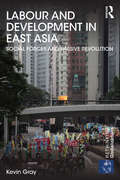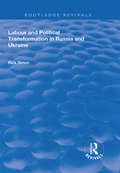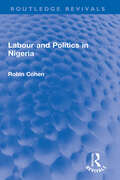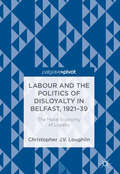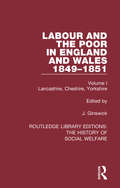- Table View
- List View
Labour Inspectors in Italy: Between Discretion and Institutional Pressure
by Rebecca ParacianiThis book analyses labour inspectors’ discretionary practices in handling complex cases of labour exploitation in the Italian context. By outlining three years of field research, the volume uses the theoretical framework of street-level bureaucracy in the Italian context and integrates it with a neo-institutionalist perspective, focusing on the isomorphic pressures from the institutional field in which the labour inspectors operate. The book will be of use to advanced undergraduate students and scholars in the fields of sociology, organization studies, law and criminology, political science and public administration.
Labour Law Reforms in India: All in the Name of Jobs (Critical Political Economy of South Asia)
by Anamitra RoychowdhuryLabour market flexibility is one of the most closely debated public policy issues in India. This book provides a theoretical framework to understand the subject, and empirically examines to what extent India’s ‘jobless growth’ may be attributed to labour laws. There is a pervasive view that the country’s low manufacturing base and inability to generate jobs is primarily due to rigid labour laws. Therefore, job creation is sought to be boosted by reforming labour laws. However, the book argues that if labour laws are made flexible, then there are adverse consequences for workers: dismantled job security weakens workers’ bargaining power, incapacitates trade union movement, skews class distribution of output, dilutes workers’ rights, and renders them vulnerable. The book: identifies and critically examines the theory underlying the labour market flexibility (LMF) argument employs innovative empirical methods to test the LMF argument offers an overview of the organised labour market in India comprehensively discusses the proposed/instituted labour law reforms in the country contextualises the LMF argument in a macroeconomic setting discusses the political economy of labour law reforms in India. This book will interest scholars and researchers in economics, development studies, and public policy as well as economists, policymakers, and teachers of human resource management.
Labour Market Deregulation in Japan and Italy: Worker Protection under Neoliberal Globalisation (Nissan Institute/Routledge Japanese Studies)
by Hiroaki Richard WatanabeJapan and Italy encountered severe economic problems in the early 1990s, and the governments had to deal with those issues effectively under the increasing neoliberal pressures of globalisation. In this context, labour market deregulation was considered an effective tool to cope with those economic problems. However, the forms and degrees of labour market deregulation in the two countries were quite different. This book seeks to explain the differences in labour market deregulation policies between Japan and Italy, despite the fact that the two countries shared a number of similar political, social and labour market (if not cultural) characteristics. Uniquely, it takes a political, rather than economic or sociological perspective to provide a theoretical and empirical analysis of the processes of labour market deregulation in the two countries. The precarious working conditions of an increasing number of non-regular workers has become a prominent social issue in many industrialised countries including Japan and Italy, but the level of the protection for these workers depends on a country’s labour market policies, which are affected by the power resources of labour unions and labour policy-making structures. This book provides a useful perspective for understanding the root causes of this phenomenon, such as the diffusion of ‘neoliberal’ ideas aimed at promoting labour-market flexibility under globalisation, and demonstrates that there is still room for politics to decide the extent of deregulation and maintain worker protection from management offensives even in an era of globalisation. Labour Market Deregulation in Japan and Italy: Worker Protection under Neoliberal Globalisation will appeal to students and scholars of Japanese politics, Italian politics, political economy and comparative politics.
Labour Midwifery Skills: Survival Guide (Nursing and Health Survival Guides)
by Alison EdwardsThis pocket-sized book, presented in an easy-to-follow format, is designed as a tool for students and professionals to carry in any setting, providing a quick reference guide to supporting women during labour. Used as a platform for wider reading, this text is an ideal reference point for any student or professional involved with the care of childbearing women.
Labour Migration and Human Trafficking in Southeast Asia: Critical Perspectives (Routledge Contemporary Southeast Asia Series)
by Willem Van Schendel Michele Ford Lenore LyonsSince the signing of the UN Trafficking Protocol, anti-trafficking laws, policies and other initiatives have been implemented at the local, national and regional levels. These activities have received little scholarly attention. This volume aims to begin to fill this gap by documenting the micro-processes through which an anti-trafficking framework has been translated, implemented and resisted in mainland and island Southeast Asia. The detailed ethnographic accounts in this collection examine the everyday practices of the diverse range of actors involved in trafficking-like practices and in anti-trafficking initiatives. In demonstrating how the anti-trafficking framework has become influential – and even over-determining – in some border sites and yet remains mostly irrelevant in others, the chapters in this collection explore the complex connections between labour migration, migrant smuggling and human trafficking.
Labour Migration and Social Development in Contemporary China (Comparative Development and Policy in Asia)
by Rachel MurphySince the mid-1980s, mass migration from the countryside to urban areas has been one of the most dramatic and noticeable changes in China. Labour migration has not only exerted a profound impact on China’s economy; it has also had far-reaching consequences for its social development. This book examines labour migration in China, focusing on the social dimensions of this phenomenon, as well as on the economic aspects of the migration and development relationship. It provides in-depth coverage of pertinent topics which include the role of labour migration in poverty alleviation; the social costs of remittance and regional, gender and generational inequalities in their distribution; hukou reform and the inclusion of migrants in urban social security and medical insurance systems; the provision of schools for migrants’ children; the provision of sexual health services to migrants; the housing conditions of migrants; the mobilization of women workers’ social networks to improve labour protection; and the role of NGOs in providing social services for migrants. Throughout, it pays particular attention to policy implications, including the impact of the recent policy shift of the Chinese government, which has made social issues more central to national development policies, and has initiated policy reforms pertaining to migration.
Labour Migration from China to Japan: International Students, Transnational Migrants (Nissan Institute/Routledge Japanese Studies)
by Gracia Liu-FarrerChinese students are the largest international student population in the world, and Japan attracts more of them than any other country. Since the mid-1980s when China opened the door to let private citizens out and Japan began to let more foreigners in, over 300 thousand Chinese have arrived in Japan as students. Student migrants are the most visible, controversial and active Chinese immigrants in Japan. The majority of them enter Japan’s labour market and many have stayed on indefinitely. Based on the author’s original fieldwork data and government statistics, this book gives a comprehensive portrayal of an often neglected group of international migrants in a society that for decades has been considered a non-immigrant country. It introduces Chinese students’ diverse mobility trajectories, analyses their career patterns, describes their transnational living arrangements, and explores the mechanisms that give rise to their identity as 'new overseas Chinese'. This book contributes to our understanding of international migration and international education in an age of globalization. It points out that student migrants are key to the internationalization of Japanese society, and potentially in other countries where immigration is still considered a challenging reality. This book will be of interest to students and scholars of Chinese Studies, Japanese Studies, Sociology and Labour Studies.
Labour Migration in Europe Volume I: Integration and Entrepreneurship among Migrant Workers – A Long-Term View
by Francesca Fauri Paolo TedeschiIn this book, Fauri and Tedeschi bring together contributions that outline the movement of job seekers and ethnic minority entrepreneurs in Europe, to analyse the overall impact of different forms of migration on European economies in the last 100 years. Contributions address a broad range of themes, from the motivations of migrants and the process of their integration into their destination country, to their overall social and economic impact onto said country at a structural level. In addressing questions as to why some ethnic groups seem to compete more successfully in business, as well as addressing questions about how skilled labour can be attracted and retained, this volume forms part of a very important multidisciplinary dialogue on labour migration. The policy implications of answering such questions are also discussed, as contributors ultimately examine whether skills-dependent migration policy needs to form part of a common strategy, either at a national or an international level.
Labour Migration in Europe Volume II: Exploitation and Legal Protection of Migrant Workers
by Marco BorraccettiViolence, deception, fraud and abuse have always been commonplace occurrences for migrants, not only in their final country of destination but also in their countries of origin and countries of transit. In today’s world, the link between mobility and security issues is ever-increasing. Acknowledging this, how can we work to protect and improve migrants’ rights? Is the protection for migrants offered by the EU sufficient as-is, or is a more integrated approach that requires greater cooperation from migrants’ country of origin called for? What role can the private sector play in all of this? In this book, Borraccetti brings together contributions that analyse how migrant exploitation can be combatted. All essays focus on the protection and promotion of human rights and pay particular attention to the rights of children and other vulnerable people.
Labour Migration in the European Union: The Policy-Making Process
by Gönül OğuzNo analysis of migration in Europe today can avoid consideration of the role of the EU institutions, as well as the member states, in policy-making. This is because the obstacles for labour mobility which have confronted the EU in the post-enlargement period have been multi-dimensional in nature, have encompassed many different aspects of European integration process, and have operated at many different levels. Recent developments in the free movement of labour in Europe entail a comprehensive analysis of the dynamic of migration policy process, contextualising institutional change, cooperation, control and competition between the EU institutions and the member states. This book provides a picture of how governance of labour migration is constructed, managed, negotiated and decided at the European level. It brings together in an informed and well-organized way some of the key issues in the face of current migration crises and Brexit.
Labour Migration, Human Trafficking and Multinational Corporations: The Commodification of Illicit Flows (Routledge Transnational Crime and Corruption)
by Ato Quayson Antonela ArhinAlthough much literature on human trafficking focuses on sex trafficking, a great deal of human trafficking results from migrant workers, compelled - by economic deprivation in their home countries - to seek better life opportunities abroad, especially in agriculture, construction and domestic work. Such labour migration is sometimes legal and well managed, but sometimes not so – with migrant workers frequently threatened or coerced into entering debt bondage arrangements and ending up working in forced labour situations producing goods for illicit markets. This book fills a substantial gap in the existing literature given that labour trafficking is a much more subtle form of exploitation than sex trafficking. It discusses how far large multinational corporations are involved, whether intentionally or unintentionally, in human trafficking for the purposes of labour exploitation. They explore how far corporations are driven to seek cheap labour by the need to remain commercially competitive and examine how the problem often lies with corporations’ subcontractors, who are not as well controlled as they might be. The essays in the volume also outline and assess measures being taken by governments and international agencies to eradicate the problem.
Labour Migration: The Internal Geographical Mobility of Labour in the Developed World (Routledge Library Editions: Labour Economics #10)
by James H. Johnson John SaltFirst published in 1990. This edited work brings together a collection of studies, by an international team of contributors, on inter-urban migration, which is largely dominated by labour migration. The structure of the book reflects the interaction of the supply and demand of labour and the information flows that make this possible. The book offers a multi-dimensional analysis of labour migration, including behavioural, economic and institutional approaches. It combines various scales of analysis, including the national scale, the occupational scale and the household scale. The study also examines labour migration in a variety of national contexts. It will be of particular value to professional geographers, economists and sociologists with an interest in the distribution of population and the labour force, planners with responsibility for the development of policy and some final year graduate students.
Labour Mobility and Rural Society
by Arjan De Haan Ben RogalyComprising seven edited pieces of detailed empirical work drawn from recent research, this title reveals the dynamics behind the movements of poor people in South and South East Asia and Africa.
Labour Mobility in the European Union as an Example of the Transnationalization of Employment
by Torben KringsThis book examines the changing significance of intra-European labor mobility in the 21st century. The focus is on the driving forces, the labor market effects and the regulation of this mobility. It is shown that there is a demand for workers with different qualifications in the "post-industrial" societies of Western Europe. This demand is primarily met by migration from the enlarged EU. However, this is no longer traditional labor migration, but the mobility of EU citizens. This brings with it new opportunities, but also challenges in a transnational mobility space, which is also a space of inequality.
Labour Problems of Technological Change (Routledge Library Editions: Labour Economics #8)
by L. C. Hunter G. L. Reid D. BoddyFirst published in 1970. This book is concerned with the examination and assessment of the impact of changes in technology on companies in three selected industries: printing, steel and chemicals. Its main focus is on the employment and associated labour market effects of technological change; but part of the rationale for the study as a whole has been to relate these effects to the technological environment of each industry. Accordingly, a good deal of attention has been paid to the character of the innovations themselves and to their implications for the industries in general terms. This title will be of interest to students of Business Studies and Economics.
Labour Questions in the Global South
by Praveen Jha Walter Chambati Lyn OssomeThis book provides a focus on some of the main markers and challenges that are at the core of the study of structural transformations in contemporary capitalism and their implications for labour in the Global South. It examines the diverse perspectives and regional and social variations that characterise labour relations as a result of the uneven development which is an important facet of the intensification of capitalist accumulation.. The book provides important insights into the impact of the crises of capitalism on the wellbeing of labour at different historical junctures. Some of the issues covered by it include the conditions of work, and the changing composition of laboring classes and/or working people. The chapters also throw light on the multiple trajectories in the development of labour relations and employment in the Global South, especially after the ascendancy and domination of neoliberal finance capitalism. Some of the major aspects considered by the essays include the decentering of production and development of global value systems, crisis of social reproduction, and the rising informalisation of work.
Labour Relations and Political Change in Eastern Europe: A Comparative Perspective (Routledge Library Editions: The Labour Movement #39)
by Stephen G. JonesFirst published in 1995. This volume offers a comparative perspective on labour relations and political change in eastern Europe within a common theoretical and empirical framework. Its coverage includes Bulgaria, and Czech and Slovak republics, Hungary, Poland, and Russia. Particular attention is given to the dynamics of changes in labour relations and privatisation, which are now critical to the more general process of political and economic transformation. This title will be of interest to scholars and students of politics, sociology and modern history.
Labour Rights and the Catholic Church: The International Labour Organisation, the Holy See and Catholic Social Teaching (Law and Religion)
by Paul BeckettThis book explores the extent of parallelism and cross-influence between Catholic Social Teaching and the work of the world’s oldest human rights institution, the International Labour Organisation (ILO). Sometimes there is a mutual attraction between seeming opposites who in fact share a common goal. This book is about just such an attraction between a secular organisation born of the political desire for peace and justice, and a metaphysical institution much older founded to bring peace and justice on earth. It examines the principles evident in the teachings of the Catholic Church and in the secular philosophy of the ILO; together with the theological basis of the relevant provisions of Catholic Social Teaching and of the socio-political origins and basis of the ILO. The spectrum of labour rights covered in the book extends from the right to press for rights, i.e., collective bargaining, to rights themselves – conditions in work – and on to post-employment rights in the form of social security and pensions. The extent of the parallelism and cross-influence is reviewed from the issue of the Papal Encyclical of Pope Leo XIII Rerum Novarum (1891) and from the founding of the ILO in 1919. This book is intended to appeal to lay, professional and academic alike, and will be of interest to researchers and academics working in the areas of international human rights, theology, comparative philosophy, history and social and political studies. On 4 January 2021 it was granted an Imprimatur by the Roman Catholic Archbishop of Liverpool, Malcolm P. McMahon O.P., meaning that the Catholic Church is satisfied that the book is free of doctrinal or moral error.
Labour Women in Power: Cabinet Ministers in the Twentieth Century
by Paula BartleyThis book examines the political lives and contributions of Margaret Bondfield, Ellen Wilkinson, Barbara Castle, Judith Hart and Shirley Williams, the only five women to achieve Cabinet rank in a Labour Government from the party’s creation until Blair became Prime Minister. Paula Bartley brings together newly discovered archival material and published work to provide a survey of these women, all of whom managed to make a mark out of all proportion to their numbers. Charting their ideas, characters, and formative influences, Bartley provides an account of their rise to power, analysing their contribution to policy making, and assessing their significance and reputation. She shows that these women were not a homogeneous group, but came from diverse family backgrounds, entered politics in their own discrete way, and rose to power at different times. Some were more successful than others, but despite their diversity these women shared one thing in common: they all functioned in a male world.
Labour and Capital Use in Indian Manufacturing: Structural Aspects (Sustainable Industrial Development)
by Anjali TandonThis book strengthens our understanding of Indian manufacturing. It argues that structural transformation should be guided by the given factor endowments. The book undertakes detailed empirical scrutiny to provide inputs for guiding the future industrial policy in India. The book recognises the differential structure of organised and unorganised manufacturing with their distinguished response to the use of labour and capital. The analytical framework consists of an economy-wide approach and structural relationships at the industry level. The underlying sectoral interdependence highlights the job creation potential of domestic manufacturing, which spreads into the non-manufacturing sectors through the essential accounting of the embodied effects. The impact of import utilisations underscores the leakages in the domestic economy in terms of the employment forgone and capital use, thereby highlighting the need to strengthen domestic production. The book clearly identifies the labour- and capital-intensive categories of manufacturing for empirical investigations. A comprehensive read on labour and capital use in Indian manufacturing, this book in the series Sustainable Industrial Development will appeal to scholars and researchers of economics, applied industrial economics, Indian economy, and business studies. It will also be of interest to professionals and practitioners in policy circles and research think tanks.
Labour and Development in East Asia: Social Forces and Passive Revolution (Rethinking Globalizations)
by Kevin GrayThe Chinese Communist Party’s response to the wave of factory strikes in the early summer of 2010 has raised important questions about the role that labour plays in the transformation of world orders. In contrast to previous policies of repression towards labour unrest, these recent disputes centring round wages and working conditions have been met with a more permissive response on the part of the state, as the CCP ostensibly seeks to facilitate a transition away from a model of political economy based on ‘low-road’ labour relations and export dependence. Labour and Development in East Asia shows that such inter-linkages between labour, geopolitical transformations, and states’ developmental strategies have been much more central to East Asia’s development than has commonly been recognised. By adopting an explanatory framework of the labour-geopolitics-development nexus, the book theorises and provides an historical analysis of the formation and transformation of the East Asian regional political economy from the end of the Second World War to the present, with particular reference to Japan, South Korea, Taiwan and China. This book will be required reading for students and scholars of international relations, development studies and comparative politics.
Labour and Political Transformation in Russia and Ukraine (Routledge Revivals)
by Rick SimonThis title was first published in 2000. The years 1975 to 2000 are characterized by fundamental changes in the global political landscape. Perhaps the biggest change was the collapse of certain communist regimes. This text analyzes what that meant for the USSR and Europe. It looks at the cause of change, the social forces behind them and future prospects.
Labour and Politics in Nigeria (Routledge Revivals)
by Robin CohenOriginally published in 1974 and with a new introduction for the 1981 edition, this book is a clear and vivid history of the role of organized labour in the politics of Nigeria. It covers the period from the first General Strike of 1945 to the civil war and reintegration of the country. As well as providing an analysis of the characteristics and attitudes of Nigeria’s wage earners, this study is concerned with their place in the wider political and social life of the country. The attempts of the trade unions to create a representative central labour organisation are considered, as is the internal structure of the unions themselves. The book also examines the relationship of the Unions with the political parties of the first Republic and later with the Military Government. The influence of the trade unions in the determination of wage rates is analysed. The book concludes with an overview of trade unions in other parts of Africa with which the performance and characteristics of organized labour in Nigeria are compared
Labour and the Politics of Disloyalty in Belfast, 1921-39: The Moral Economy of Loyalty
by Christopher J. V. LoughlinThis book provides the first ‘history from below’ of the inter-war Belfast labour movement. It is a social history of the politics of Belfast labour and applies methodology from history, sociology and political science. Christopher J. V. Loughlin questions previous narratives that asserted the centrality of religion and sectarian conflict in the establishment of Northern Ireland. Labour and the Politics of Disloyalty in Belfast, 1921-39 suggests that political division and violence were key to the foundation and maintenance of the democratic ancien régime in Northern Ireland. It examines the relationship between Belfast Labour, sectarianism, electoral politics, security and industrial relations policy, and women’s politics in the city.
Labour and the Poor in England and Wales - The letters to The Morning Chronicle from the Correspondants in the Manufacturing and Mining Districts, the Towns of Liverpool and Birmingham, and the Rural Districts: Volume I: Lancashire, Cheshire, Yorkshire (Routledge Library Editions: The History of Social Welfare)
by J. GinswickThe Morning Chronicle presented the state of the working classes of Britain before the public with clarity, insight and honesty. Consisting mainly of verbatim statements from the people themselves, it was a medium through which the previously inarticulate masses were able to speak with one firm voice. First published in 1983, this book collates the letters from correspondents based in Lancashire, Cheshire and Yorkshire. The letters improve our knowledge of working-class life in nineteenth century England and Wales and provide a unique insight into the impact of industrialization. This book will be of interest to those studying the history of the working class, labour and poverty.
